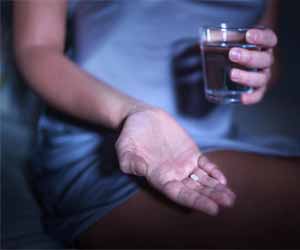- Home
- Editorial
- News
- Practice Guidelines
- Anesthesiology Guidelines
- Cancer Guidelines
- Cardiac Sciences Guidelines
- Critical Care Guidelines
- Dentistry Guidelines
- Dermatology Guidelines
- Diabetes and Endo Guidelines
- Diagnostics Guidelines
- ENT Guidelines
- Featured Practice Guidelines
- Gastroenterology Guidelines
- Geriatrics Guidelines
- Medicine Guidelines
- Nephrology Guidelines
- Neurosciences Guidelines
- Obs and Gynae Guidelines
- Ophthalmology Guidelines
- Orthopaedics Guidelines
- Paediatrics Guidelines
- Psychiatry Guidelines
- Pulmonology Guidelines
- Radiology Guidelines
- Surgery Guidelines
- Urology Guidelines
For better control of blood pressure, take BP medicines at bedtime

Spain: Taking blood pressure (BP) medication at bedtime provides maximum benefits -- is the bottom line of a recent study.
According to the study published in the European Heart Journal, hypertensive patients who take their BP medication at bedtime daily have a better controlled BP and significantly lower risk of death or illness caused by heart or blood vessel problems compared to those who take the medicine upon waking in the morning. It's a simple tip that could save lives-in order to get the best out of daily blood pressure medication, just take them before going to bed, say, researchers.
Ramón C Hermida, University of Vigo, E.I. Telecomunicación, Campus Universitario, Vigo, Spain, and colleagues conducted this Hygia Chronotherapy Trial within the clinical primary care setting. The trial was designed to test whether bedtime in comparison to usual upon awakening hypertension therapy exerts better cardiovascular disease (CVD) risk reduction.
The trial included 19 084 hypertensive patients (10 614 men/8470 women, 60.5 ± 13.7 years of age). They were assigned in the ratio 1:1 to receive the entire daily dose of ≥1 hypertension medications at bedtime (n = 9552) or all of them upon awakening (n = 9532). They were followed for longest length of time - an average of more than six years - during which time the patients' ambulatory blood pressure was checked over 48 hours at least once a year.
The researchers had adjusted their analyses to take account of factors that could affect the results, such as age, sex, type 2 diabetes, kidney disease, smoking and cholesterol levels.
Key findings of the study include:
- During the 6.3-year median patient follow-up, 1752 participants experienced the primary CVD outcome (CVD death, myocardial infarction, coronary revascularization, heart failure, or stroke).
- Patients of the bedtime, compared with the upon-waking, treatment-time regimen showed significantly lower hazard ratio—adjusted for significant influential characteristics of age, sex, type 2 diabetes, chronic kidney disease, smoking, HDL cholesterol, asleep systolic blood pressure (BP) mean, sleep-time relative systolic BP decline, and previous CVD event—of the primary CVD outcome [0.55] and each of its single components, i.e. CVD death [0.44], myocardial infarction [0.66], coronary revascularization [0.60], heart failure [0.58], and stroke [0.51].
"Current guidelines on hypertension treatment do not recommend any specified treatment time. However, morning ingestion has been recommended by physicians based on a misleading goal of reducing morning BP levels," write the authors.
"However, the Hygia Project has reported previously that average systolic blood pressure when a person is asleep is the most significant and independent indication of cardiovascular disease risk, regardless of blood pressure measurements taken while awake or when visiting a doctor. Furthermore, there are no studies showing that treating hypertension in the morning improves the reduction in the risk of cardiovascular disease."
"Daily ingestion by hypertensive patients of ≥1 prescribed BP-lowering medications at bedtime resulted in improved ambulatory blood pressure (ABP) control and most, importantly diminished the occurrence of major CVD events as compared to taking the medicines in the morning upon waking," concluded the authors.
More Information: "Bedtime hypertension treatment improves cardiovascular risk reduction: the Hygia Chronotherapy Trial" published in the European Heart Journal.
DOI: https://doi.org/10.1093/eurheartj/ehz754
Journal Information: European Heart Journal

Disclaimer: This site is primarily intended for healthcare professionals. Any content/information on this website does not replace the advice of medical and/or health professionals and should not be construed as medical/diagnostic advice/endorsement or prescription. Use of this site is subject to our terms of use, privacy policy, advertisement policy. © 2020 Minerva Medical Treatment Pvt Ltd